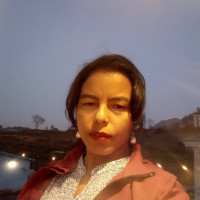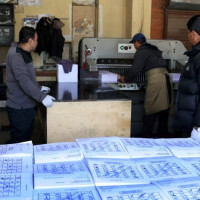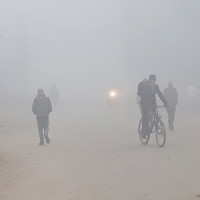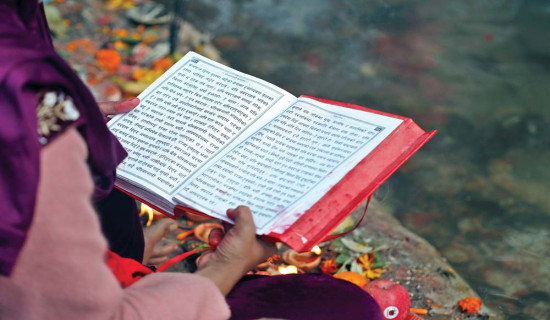- Saturday, 14 February 2026
Intersex persons face ordeals in getting jobs
Kathmandu, Mar. 30: A few newborn babies do not fit the typical definition of a male or female. Though such a case is rare, such children face problems as they grow up.
Esan Regmi of Bajura was born as a female. “When I was born, my parents raised me as a daughter,” Regmi, an intersex activist, recalled.
“By the time, my body started to develop like a boy, my friends in school began teasing me,” said Regmi. “My voice became hoarse, my beard grew, but I did not menstruate and my breasts did not grow. I knew nothing about the intersex until I was 20.”
With the physical changes, Regmi did not fit into the 'woman' and 'man' as defined by society. Others have also undergone similar ordeals.
Knowledge about Intersex issues is very limited not only in Nepal but across South Asia.
Intersex persons are born with a wide range of natural variations in their sex characteristics that don’t fit the typical definition of male or female, including sexual anatomy, reproductive organs or chromosome patterns.
As of now, there is no single data about the intersex person, but by including all the diversity of sexual characteristics and reproductive organs, experts have estimated that one in every 58 people in the world (1.7 per cent of the population) is born with intersex traits, according to the intersex fact sheet issued by the United Nations in 2015.
Similarly, the government of Nepal did not collect data on intersex persons in the 2021 census.
“Data are not just numbers. They also mean recognition. If we can collect desegregated data, it will help advocate for the intersex persons,” Regmi said.
Regmi started identifying himself as intersex after learning about the intersex from the website called ‘Inter-Sex Society of North America and gradually joined the organisation and worked as a volunteer.
Along with work, Regmi was also continuing studies. Regmi’s father had said that if one becomes self-reliant, discrimination would be reduced. So, Regmi prepared for the Public Service Examination to become a government employee.
“I went to Dipayal, Doti, on June 1, 2008, to appear in the PSC examination. In the exam hall, my admit card was checked, which is natural. However, I was told to leave the exam hall because my physical appearance did not match the name on the admit card. I wanted to explain my condition, but they did not listen to me," Regmi said.
This discrimination made Regmi more disturbed. Later, Regmi started working with various organisations. While working in such organisations, Regmi participated in an international intersex gathering for the first time in 2015 and came to know about intersex issues and movements.
A year later, Regmi organised the first national-level intersex meeting in Nepal in 2016. The meeting was organised to discuss sexual orientation, generate awareness about intersexuality and the rights of intersex persons and ensure the protection of their rights.
At that time, 13 intersex persons had gathered together to share their experiences. A year later in 2017, the Campaign for Change was registered to work for the rights of intersex people. Esan is still the co-founder and executive director of the organisation.
Due to the lack of citizenship according to identity, many intersex persons have been deprived of fundamental rights including education and health, Regmi lamented.
Among the 13 individuals who participated in the first intersex gathering, one was Arjun Chirimar from Baridya, Gulariya.
When Chirimar was born in 2001, their partners came to realise that his genitals were neither male nor female, but still, he was raised as a son.
Since birth, he had suffered from a continuous flow of urine from his genitals. My family, sought medical treatment for me in the Tribhuvan University Teaching Hospital in Kathmandu. Intersex people often face stigma and discrimination.
Ragmi stressed that society and government need to know that intersex is different from transgender and third gender.
Regmi has dedicated his whole life as an activist to fighting for a legal ban on medically unnecessary surgeries and obtaining citizenship with identity of intersex person.
Regmi submitted a shadow report to the UN CRC Committee (Convention on the Rights of the Child) to call for Nepal to stop unnecessary, non-consented, nonvital medical practice in April 2016. The UN CRC Committee reprimanded the Nepal government for such practice in June 2016.
Regmi has also submitted a shadow report to the UN CEDAW Committee to call for Nepal to stop unnecessary, non-consented, nonvital medical practices.
Regmi informed that around 100 intersex persons are connected with the Campaign for Change across the nation. But, many intersex people in Nepal remain hidden because of fear of society and the stigma attached to their identity.
“The birth certificate is the main issue that needs to be addressed as it does not include the gender identity of an intersex person. I was born as a girl but I grew up to be a man and still my birth certificate states that I am a girl,” he said.
Due to the lack of citizenship according to identity, many intersex people have been deprived of fundamental rights including education and health, said Regmi.
Many intersex people get stuck when it comes to legal documentation, he further added “People think we are frauds because our details don’t match our gender identity. As a result, many intersex people are not able to get an education and job and need to struggle with other legal systems.”
















